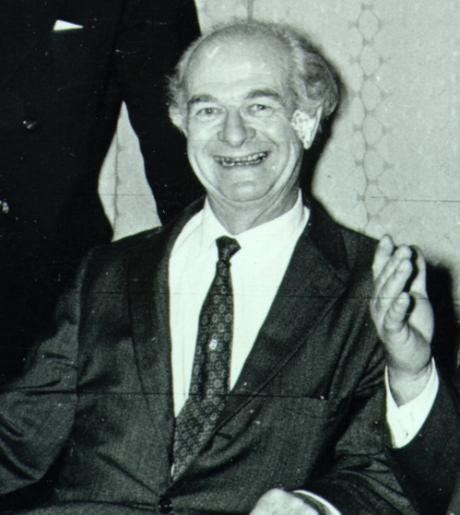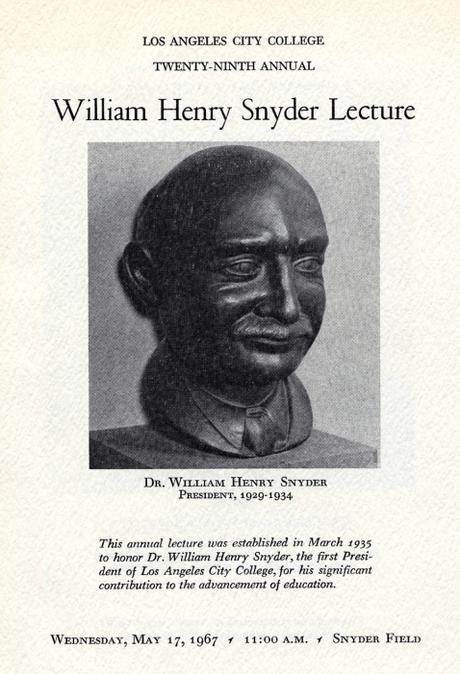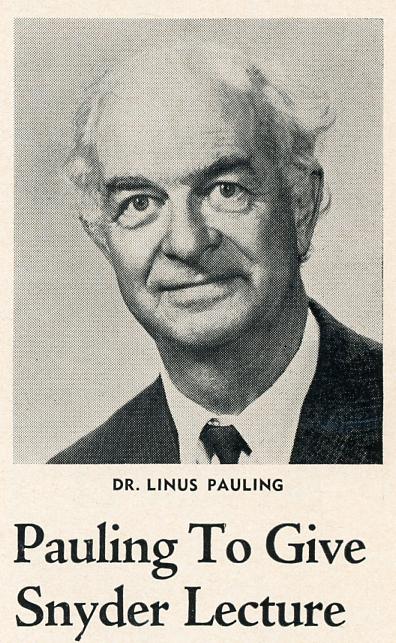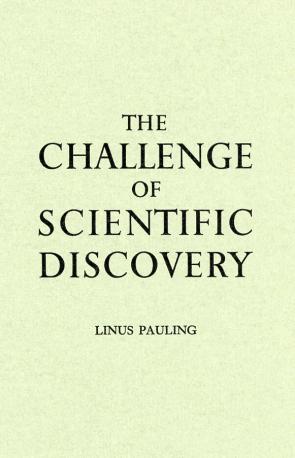
Linus Pauling, 1967
Fifty years ago, Linus Pauling found himself in a typically busy mode of life. The year 1967 started in Honolulu, Hawaii, where the Paulings visited with their eldest son, Linus Jr. They then spent the next two months traveling through Singapore, India and Sri Lanka, during which Linus delivered a series of lectures, including the Azad Memorial Lecture in New Delhi.
Once the summer arrived, Pauling made use of a one-year leave of absence from the Center for the Study of Democratic Institutions in order to take a short-term position as a professor of chemistry at the University of California, San Diego. Later, in November, he traveled to New Orleans to accept the Roebling Medal from the American Mineralogical Society.
Pauling was pretty clearly a popular speaker at this point in time. In 1967 alone, he gave roughly thirty lectures that we know of, while also trying to maintain his program of scientific research. In today’s post, we’ll examine a talk that he gave exactly fifty years ago; one that was fairly emblematic of the public speaking that he was doing during this period.

Program for Pauling’s Snyder Lecture, May 17, 1967
Because he had so many lectures planned for 1967, by November of 1966 Pauling had decided that he would not entertain any more requests. However, after receiving a letter from Hope Powell, the Dean of Student Personnel at Los Angeles City College, in which she invited him to deliver the college’s prestigious William Henry Snyder Lecture, he opted to make an exception and accept the invitation.
This was not Pauling’s first contact with the college. A few years prior, the school had contacted Pauling to inquire into the possibility of his giving their commencement address. Prior commitments rendered him unable to do so, but he suggested that they send a later invitation for another speech.
Powell followed this advice in her 1966 letter, noting that the Snyder lecture was meant to “stimulate the thinking and expand the horizons of our students,” and conveying the eagerness that both the school’s students and faculty felt at the possibility that Pauling might make a visit. In terms of a topic, Powell suggested that Pauling share his views on “the challenges to education and society presented by scientific and technological advances.”

Los Angeles Nite News, May 15, 1967
Los Angeles City College, originally known as Los Angeles Junior College, was founded in 1929 by William Henry Snyder; by 1966, it enrolled over 18,000 students. The Annual Snyder lecture was founded in 1935 to honor Snyder, a pioneer of the junior college system who made many noteworthy contributions to the field of education. Speakers previous to Pauling had included Robert Millikan, Thomas Mann, and Eleanor Roosevelt.
The Los Angeles City College Collegian was among the newspapers who previewed Pauling’s talk in the days leading up to the event. The Collegian‘s piece relied in particular on foreign languages professor Meyer Krakowski, who was serving as chair of the Lecture Committee, and who pointed out that Pauling – by then a controversial figure to many – was chosen because “his talk is educationally oriented and will appeal to the majority of students.” The article also quoted physicist Hans Bethe, who said of Pauling
Without his awakening of the public conscience on [nuclear testing] there would not have been any pressure on governments, and there would not have been any test ban.
On the morning of May 17th, Pauling arrived on campus for a press conference. An hour later, at 11:00AM, he gave the twenty-ninth annual Snyder Lecture, titled “The Challenge of Scientific Discovery.” Held outside on the school’s baseball field, the event began with the playing of the national anthem by the LACC Band, which was followed by remarks, introductions, and greetings from a series of dignitaries, including the college’s president and the president of the student body.
Meyer Krakowski then introduced Pauling, describing the day’s speaker in glowing terms:
[Pauling] finds no conflict between his position as a scientist and his position as a private citizen. Between his search for truth in science and his search for truth in society there is complete harmony. He firmly believes that science was made for man, and not man for science… Dr. Pauling has been inspired by the challenges of scientific discovery, and he gladly shares with others his enthusiasm and his inspiration.
“I want to talk to you about how science might contribute to your happiness,” Pauling began. In doing so, he described early scientific discoveries including pi, bacteria, and blood circulation that emerged from scientific inquiry spurred by simple curiosity about our world.
This sense of invigorating wonder permeated the whole of Pauling’s talk. At one point, when reflecting on Albert Einstein’s breakthroughs with relativity, Pauling commented that “he must have had a tremendous feeling of happiness when he first had his great idea.” Later, he described a fellow student who, upon learning about the discovery of electron spins, was “so excited he could hardly talk.” He likewise shared his own memories of an important moment in his unraveling the secrets of the chemical bond:
I worked at my desk nearly all that night, so full of excitement that I could hardly write. It is a wonderful feeling to understand something about the world that no one else has ever understood.
From there, Pauling emphasized the ever-evolving nature of science and the fact that new discoveries often overturn old ideas. In doing so, he hastened to point out that this evolution should not be seen as a source of discouragement for a researcher whose work might have been rendered moot. Instead, he urged the students to focus on the overarching quest for truth:
[W]e must try to understand these interesting aspects of the world. … The sources of happiness in this world are not so great that we can afford to neglect any of them, and satisfying one’s intellectual curiosity can be one of the great sources of happiness.
The end of Pauling’s speech was dedicated to a discussion of the intersection between science and morality, a topic to which he had devoted a great deal of thought. He told the students that in his world travels, he had not discerned any real difference in basic human nature, no matter where he was. As such, he declared that “we need to have a fundamental principle of morality that is independent of revelation, superstition, dogma, and creed.” He then added that “as a scientist, I have tried to work on this problem, to derive a basic ethical principle.” This core belief was that all people must work together to decrease the amount of human suffering in the world.
Pauling closed his lecture with a call to action:
I believe that the discoveries made by the scientists have brought the world together in a way that it never was before. The new means of communication and transportation have made the whole of humanity into one great organism. Our loyalty now should be to the whole of humanity. The time has come when we can make the world a great place for all human beings, everywhere, through the use of the resources of the world and the discoveries made by scientists for the benefit of humanity, and not for war, death, and destruction.
The response to Pauling’s talk was effusive in its praise. In a letter penned soon after the event, Dean Powell offered that
In an urban junior college such as ours where there are many disadvantaged students and students of every race, creed, and economic situation, it is particularly important to provide outstanding speakers such as you are, to provide them with mental stimulation and encouragement. Your visit here was thus doubly meaningful.
Meyer Krakowski added
We feel that the three thousand people who heard you…will long remember your enthusiastic discussion of the challenge of scientific discovery and the emphasis you placed on the scientists and society’s responsibility to all humanity.
Perhaps most notably however, LACC’s student government felt the evening to have been so important that they decided to allocate funds to publish a transcript made from a tape recording of the lecture. Pauling received fifty copies of the pamphlet that resulted, and many more were distributed on campus.

